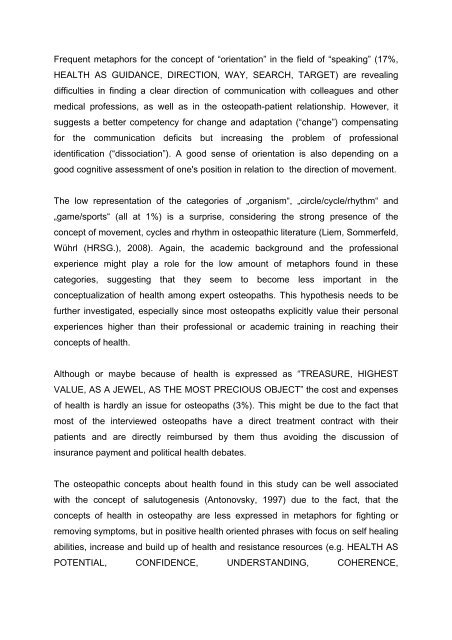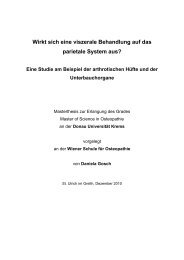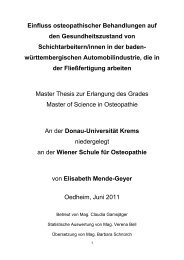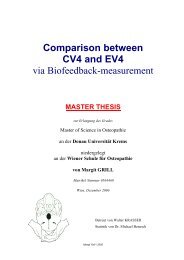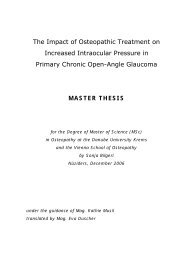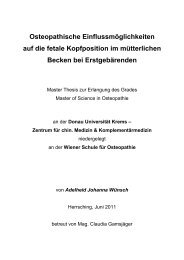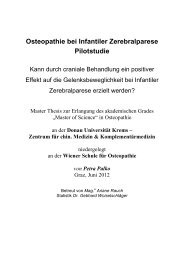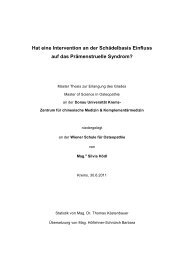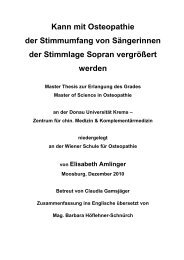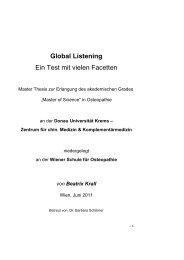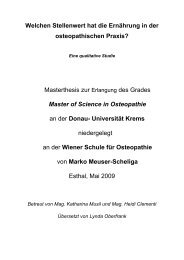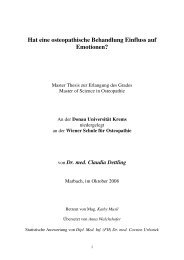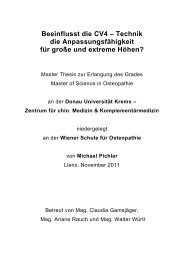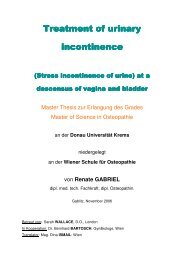Risch Andreas.pdf - Osteopathic Research
Risch Andreas.pdf - Osteopathic Research
Risch Andreas.pdf - Osteopathic Research
Sie wollen auch ein ePaper? Erhöhen Sie die Reichweite Ihrer Titel.
YUMPU macht aus Druck-PDFs automatisch weboptimierte ePaper, die Google liebt.
Frequent metaphors for the concept of “orientation” in the field of “speaking” (17%,<br />
HEALTH AS GUIDANCE, DIRECTION, WAY, SEARCH, TARGET) are revealing<br />
difficulties in finding a clear direction of communication with colleagues and other<br />
medical professions, as well as in the osteopath-patient relationship. However, it<br />
suggests a better competency for change and adaptation (“change”) compensating<br />
for the communication deficits but increasing the problem of professional<br />
identification (“dissociation”). A good sense of orientation is also depending on a<br />
good cognitive assessment of one's position in relation to the direction of movement.<br />
The low representation of the categories of „organism“, „circle/cycle/rhythm“ and<br />
„game/sports“ (all at 1%) is a surprise, considering the strong presence of the<br />
concept of movement, cycles and rhythm in osteopathic literature (Liem, Sommerfeld,<br />
Wührl (HRSG.), 2008). Again, the academic background and the professional<br />
experience might play a role for the low amount of metaphors found in these<br />
categories, suggesting that they seem to become less important in the<br />
conceptualization of health among expert osteopaths. This hypothesis needs to be<br />
further investigated, especially since most osteopaths explicitly value their personal<br />
experiences higher than their professional or academic training in reaching their<br />
concepts of health.<br />
Although or maybe because of health is expressed as “TREASURE, HIGHEST<br />
VALUE, AS A JEWEL, AS THE MOST PRECIOUS OBJECT” the cost and expenses<br />
of health is hardly an issue for osteopaths (3%). This might be due to the fact that<br />
most of the interviewed osteopaths have a direct treatment contract with their<br />
patients and are directly reimbursed by them thus avoiding the discussion of<br />
insurance payment and political health debates.<br />
The osteopathic concepts about health found in this study can be well associated<br />
with the concept of salutogenesis (Antonovsky, 1997) due to the fact, that the<br />
concepts of health in osteopathy are less expressed in metaphors for fighting or<br />
removing symptoms, but in positive health oriented phrases with focus on self healing<br />
abilities, increase and build up of health and resistance resources (e.g. HEALTH AS<br />
POTENTIAL, CONFIDENCE, UNDERSTANDING, COHERENCE,


